Introduction
The sphere of aviation faces numerous challenges today. The high level of terrorist threat along with increased demands on the quality of air travel result in changes to the traditional approaches that were used during previous decades. In this regard, one can now observe sweeping changes in the way airports function and the methods used to guarantee security and an outstanding quality of service. The majority of procedures that are used in an airport are being studied to find areas where change could significantly improve their efficiency.
There is also the tendency towards digitalization and automation of many procedures and processes. However, despite significant technological advances, the human factor still remains relevant, as human impetus is the main component of any system. For this reason, the human factor in aviation security becomes a crucial issue that should be investigated in order to improve this aspect and minimize the probability of error.
Background
According to recent statistics, the probability of error due to human factors ranges from 15 to 30 percent (Ferguson & Nelson 2013). This range is extremely high considering the fact that people’s lives are at stake (see Figure 1). Additionally, there are numerous cases which demonstrate the extremely high price of a mistake in the aviation sphere (ICAO 2016). For this reason, numerous attempts are being made today to decrease such a significant factor. The use of advanced technologies to attain increased efficiency is one of the methods to accomplish this goal.
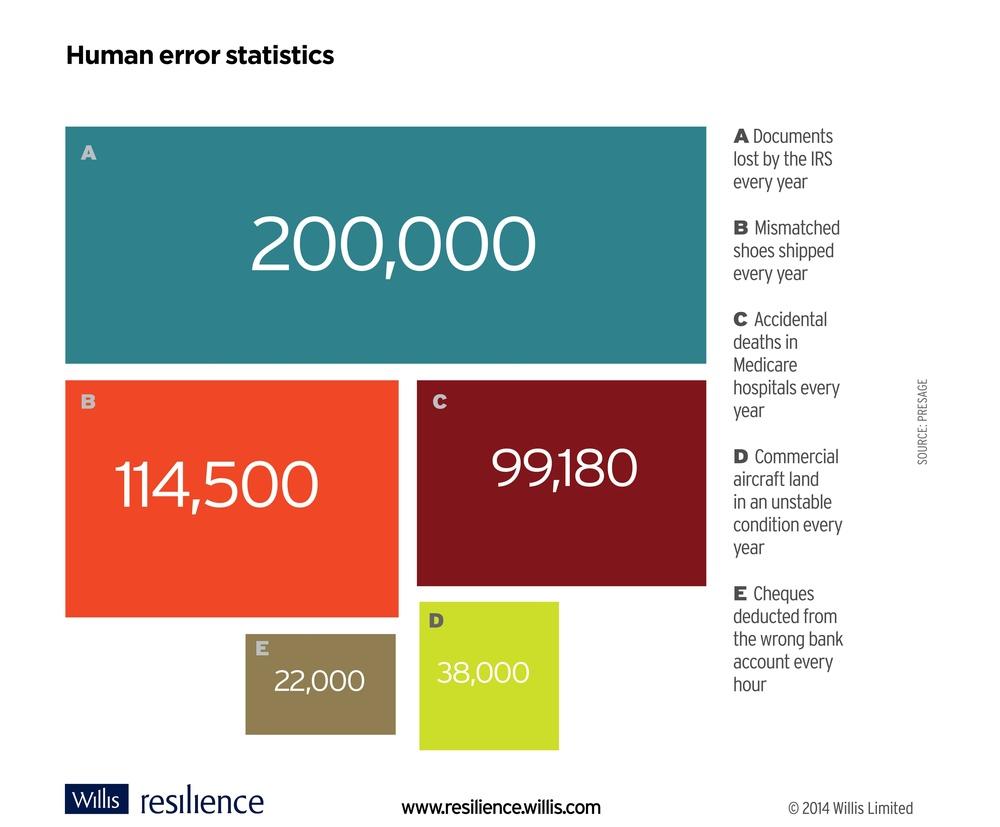
However, even this should not be considered the ideal solution, as the human factor impacts all processes that occur in the airport. The comprehensive investigation of issues related to the human factor and their impact on the overall state of airport security systems thus emerges as a way to decrease the number of mistakes by eliminating factors that could precondition these mistakes’ appearance. Additionally, motivation becomes a significant factor that should be considered, as recent studies in the field of aviation demonstrate a high correlation between motivation and a worker’s performance.
The Human Factor
In general, the human factor can be defined as the set of physiological, biological, social, and psychological characteristics of an individual or group of individuals that could impact any process and precondition its outcomes (Hancock & Hart 2002). Therefore, the human factor is one of the key elements of any system’s functioning, as it cannot be excluded from numerous activities (see Figure 2).
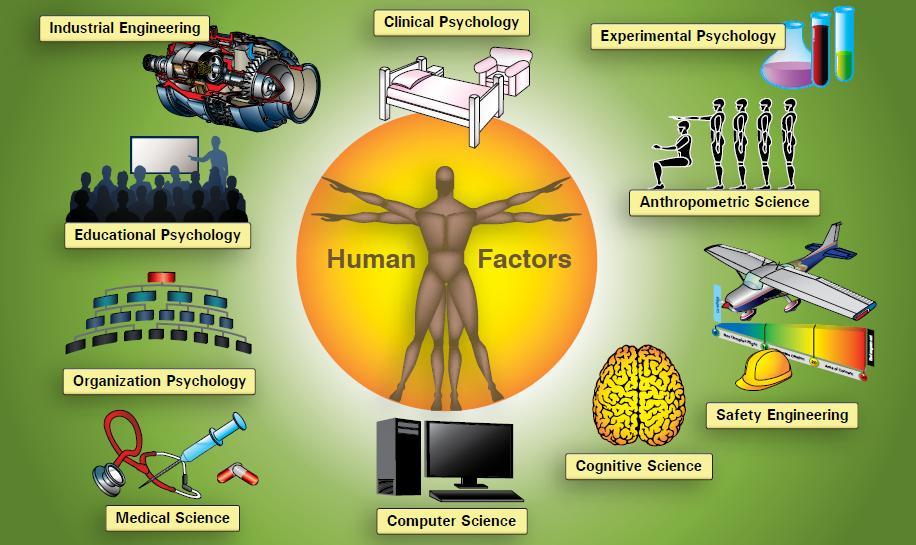
The human factor therefore becomes the primary aspect to which attention must be given because of its great importance. In the majority of cases, a mistake occurs when human factors, the environment, and technologies interact (see Figure 3). For this reason, it is important to consider all these aspects.
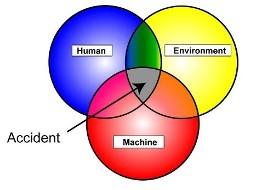
However, in many cases, priority is given to ways that could improve performance and attain better results. Yet the probability of mistake might still remain high, even if a worker demonstrates outstanding results. Under these conditions, it becomes extremely important to introduce a new pattern that is focused on decreasing the probability of mistake. In the sphere of aviation, this task requires high priority. The fact is that that ensuring increased passenger security is impossible when decisions are prone to error. That is why it is crucial to evaluate risks that arise from human factors and introduce measures to decrease them.
The Dirty Dozen
Delving into the issue, the so-called Dirty Dozen should be mentioned (see Figure 4). This phrase refers to a set of aspects that impact a person and could be considered the human factors that lead to a deterioration in function of a particular organization (Hall 2015). The appearance of these aspects is precipitated by the clash of different psychological, emotional, motivational, and communicational stressors that could distract a person and result in the deterioration of his or her attention. It is crucial to consider the particularities of environment that precipitate the appearance of these irritants.
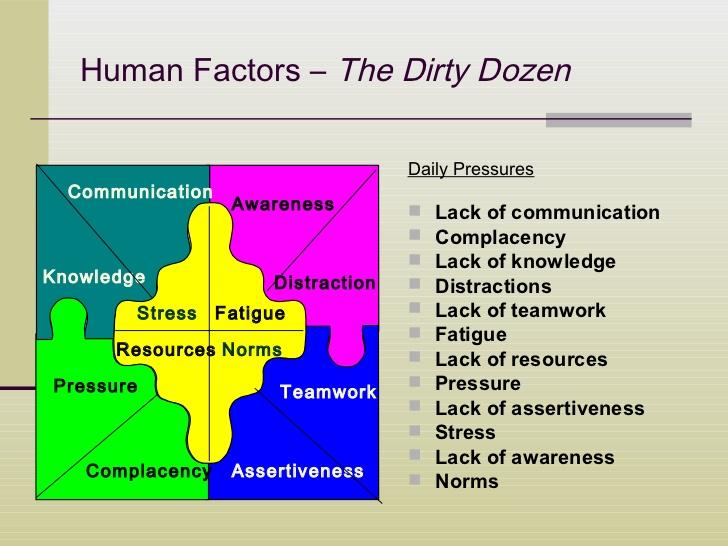
Risks
Modern organizations that function in the sphere of aviation like ICAO, IATA, etc., also recognize the great significance of the issue of human factors and the necessity of altering the current situation in the aviation industry (ICAO: Human Factors documents n.d.). For instance, ICAO states that human factors can today be associated with numerous risks such as failures in operations, flight operations officers’ mistakes, pilots’ inability to make the right decision, the appearance of security vulnerabilities because of a lack of attention, etc. (Krause 2003).
The majority of accidents are caused by the flight crew (see Figure 5)The organisation also emphasizes that participating states should devote their attention to this issue and introduce measures that could help to minimize the risk of failure or undesired outcome (ICAO 2016).
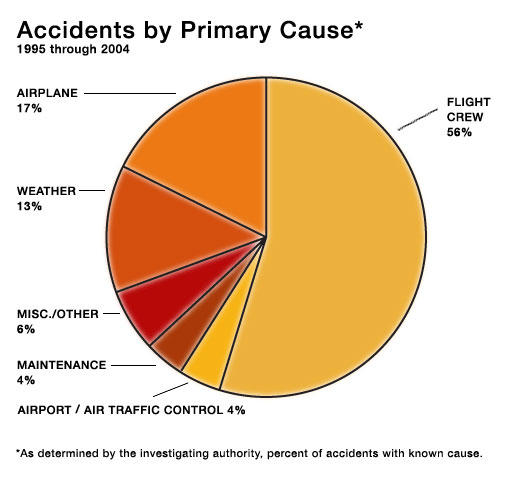
Furthermore, ICAO also outlines the direct correlation between the level of workers’ performance and the Airport’s security (Price 2013). Due to the combination of these elements, the human factor becomes central to attempts to guarantee a safe environment for passengers and protect them from various hazards.
Correlation Between Motivation and Performance
Delving into the sphere of workers’ performance and the factors that impact it, researchers typically single out motivation as the main aspect that preconditions a person’s level of efficiency and success (Raphael 2013). Motivation can be defined as the main factor or stimulus that affects a person and makes him or her perform certain actions. It follows from this definition that motivation has a great impact on a person’s performance.
In cases where an individual has the desire to perform certain actions or is motivated to do them, results will be much better (Raphael 2013). This fact has been demonstrated by numerous investigations that have found an increased level of attention, concentration, and inspiration among people who are motivated to do a specific task (Raphael 2013). Additionally, people with a high level of motivation and involvement in a process demonstrate better outcomes and a lower percentage of errors. This factor is crucial for the sphere of aviation. As a highly motivated person demonstrates better performance along with a reduced frequency of mistakes, it is important to attain high motivation levels among employees working in an airport.
Intrinsic Motivation
In aiming for a significant improvement in motivation and workers’ engagement, it is crucial to keep in mind that there are two different types of motivation: intrinsic and extrinsic. Intrinsic motivation refers to factors that precondition a person’s desire to perform a certain activity because of his or her own internal needs. In other words, this activity could be considered satisfying for him or her at the moment, and he or she engages in it willingly (Rankin 2010).
This sort of motivation is important for an employee working in the sphere of aviation for several reasons. First, it improves outcomes significantly. Second, it preconditions a worker’s positive attitude toward all activities he or she performs. Third, the probability of mistakes is significantly reduced because of the high level of involvement (Schwaninger 2006). For these reasons, high intrinsic motivation is crucial for a person working in an airport.
Extrinsic Motivation
As for extrinsic motivation, it could be defined as a set of preferences or behaviors that are preconditioned by external factors like rewards, money, praise, etc. (Security Case Study n.d.). It originates outside the individual and could be impacted by the organization where he or she works. Additionally, investigators state that if the level of extrinsic motivation remains high for a certain period of time, intrinsic motivation could also be altered and improve (Tamasi & Demichela 2011).
This information is crucial for the modern approach to security in the aviation sphere. It means that by trying to improve workers’ level of motivation, an airport will also promote better outcomes achieved through a significant decrease in the mistake probability rate. Moreover, the focus on this aspect will also encourage an enhanced quality of services provided to passengers and better cooperation within the Airport. For these reasons, it becomes crucial to attaining improved motivation levels among workers.
Factors that Impact Motivation
There are numerous factors that should be taken into account to engage a person in a certain activity and promote improved outcomes. First of all, it is important to achieve the appropriate level of satisfaction, as it directly impacts motivation and the desire to perform these activities. Second, the existence of opportunities for both personal and professional growth is also important for high motivation levels. Third, fair and efficient reward practices could also help to enhance a worker’s desire to perform a certain activity. Besides these factors, there are several others that should be considered as they have a large collective effect and cultivate a specific culture that could promote a reconsideration of outdated approaches and assure that the needed level of motivation is preserved. It is, therefore, useful to touch upon the most important of these factors
Salary
It is widely recognized that an appropriate salary level is one of the main factors that impact workers’ satisfaction and motivation. Numerous studies have found that even if a person is not interested in his or her job, a high salary leads to a significant degree of involvement in the work process, as the worker feels responsible for the final result (Yeh et al. 2012). Moreover, the appropriate level of salary could help to improve living conditions and decrease stress and fatigue.
At the same time, it encourages enhanced attention to detail and improved outcomes. In this way, salary still remains one of the crucial factors that promote high motivation levels. An airport’s managers should be prepared to guarantee an appropriate salary to workers who hold the most important posts in order to avoid the negative impact of low motivation and encourage their contribution to avoiding mistakes.
Rewards
The practice of awarding incentives is another factor that impacts the level of motivation significantly. Investigators have found a direct correlation between a person’s mood and his or her ability to perform certain activities at a high level (Cromie et al. 2015). At the same time, rewards help to improve a worker’s mood and his or her satisfaction with the current job. Because of this, rewards could be considered an important factor that influences both satisfaction and motivation levels.
However, it is necessary to assure workers that the awarding of incentives is fair so that they will understand that the awards have been earned. By using rewards as motivation, an airport could attain significant improvement in the overall results in different departments. Moreover, a bonus award could serve as an additional goal for a person who hopes to obtain a significant sum of money and praise from his or her employer.
Career Growth
When analyzing factors that impact a person’s motivation and level of satisfaction in the workplace, it is also important to ensure that there are opportunities for career growth. At the moment, any airport is a closed system characterized by a strict hierarchy within any department (Cromie et al. 2015). This means that every employee is subordinate to some manager and should be immediately ready to accomplish tasks given to him or her.
This kind of environment could be depressing and deteriorate motivation levels among workers (Cromie et al. 2015). For this reason, it is important to cultivate an understanding that common workers could rise into managerial posts if they demonstrate great commitment and efficiency and have a low number of mistakes. Opportunities for career growth constitute a crucial factor that complements high intrinsic motivation levels and helps workers to avoid mistakes because of a lack of concentration.
Opportunities for Development
Career growth is closely related to a person’s personal and professional development. It is apparent that career growth presupposes an evolution of various skills needed to perform the tasks for which one is responsible and to complete them efficiently. For this reason, the environment in which a worker operates should provide him or her with opportunities for development. For the Airport and its workspace, this means that all employees should be offered additional training to help them enhance their skills.
In addition, levels of motivation are related to a person’s confidence and belief in his or her competencies. Opportunities for personal and professional growth remain essential for gradually increasing levels of motivation. Advancement opportunities also promote a better understanding of workplace tasks, increase efficiency, and increase the chance of better outcomes.
Job Satisfaction
As stated above, a satisfied worker is an effective worker. This means that job satisfaction is closely related to a worker’s performance level and overall efficiency. Because of this, an airport should create conditions that will cultivate increased job satisfaction, as it is one of the essential elements for improved airport security. Satisfied workers have plans related to their would-be positions and careers.
Because of this, they devote much attention to aspects of their jobs that might be ignored by less careful workers. Moreover, all the above-mentioned aspects are relevant to job satisfaction, as salary, rewards, career growth, etc. impact job satisfaction and affect motivation. If all these factors receive proper attention, improved outcomes, and a decreased probability of errors could be expected.
Collective factors
Numerous research works devoted to the investigation of motivation, its oscillation, and factors that could impact it have identified collective factors as another important aspect with a significant impact on a person and his or her performance (Cromie et al. 2015). Researchers have found that airports characterized by positive relations between colleagues and established traditions demonstrate better performance than airports where these factors could not be observed (Caldwell 2012).
In other words, the atmosphere within the staff as a whole becomes an important element of the functioning of any airport. Additionally, the feeling of belonging to a friendly collective and the support that is provided by colleagues reduces the work strain and decreases the probability of mistakes significantly. For this reason, teambuilding remains a crucial activity if improved security is needed. Investigations also found that improved cooperation between employees led to better results and reduced the time needed for the accomplishment of a given task. These findings suggest the substantial impact that collective relations have on motivation.
Rewarding Character of Job
Another factor that impacts a worker’s motivation is how rewarding the activities he or she performs are. Traditionally, important and challenging occupations that demand great competence and result in a significant improvement to a certain aspect of people’s lives are respected by society. At the same time, employees working in the service industry might suffer from a lack of support and reward (Caldwell 2012).
For instance, pilots remain the primary actors associated with aviation, and they receive great attention because of the visible results of their actions. However, the airport staff is often forgotten, as their actions are not noticed by most passengers. This might have a negative impact on employees’ performance and undermine their motivation. Today, however, we can observe a shift of priorities towards reconsidering the role of workers who support the functioning of the Airport and its systems (Caldwell 2012). This shift encourages an increased level of motivation and better results among airport staff.
Innovative Environment
The reconsideration of the approach to aviation safety and digital advances have resulted in significant alterations to the way airports traditionally used to function. The appearance of this new environment is expected to have significant positive effects (Caldwell, 2012). These effects might be achieved through the increased efficiency of new digital methods used in calculations, data processing, and management, as well as through the enhancement of workers’ satisfaction and motivation.
According to relevant statistics gathered by researchers, this new and innovative environment cultivates a new work culture characterized by an altered approach to jobs and workers’ participation in them (Demosthenous 2007). This means that employees become engaged in the work process because of their inner motivation to investigate new technologies and use them in practice to attain better results. Moreover, the use of new devices helps to minimize the probability of mistakes. For these reasons, an innovative work environment is one of the factors that increase a worker’s motivation.
Safety
Finally, numerous studies have found that a person is not able to function efficiently if he or she does not feel safe. Due to the threat of terrorism, an airport could be considered a dangerous environment where workers might suffer from a high level of stress. For this reason, appropriate security systems and safety measures could be considered as factors that increase employees’ motivation significantly.
As a part of the security system, a worker realizes the current state of protection and is familiar with the majority of vulnerabilities that could be exploited. Because of this, the elimination of these vulnerabilities remains a crucial task, as it directly impacts workers’ motivation. Furthermore, improved safety measures are an integral part of the modern change process aimed at a radical reorganization of airports in order to improve their functioning. For this reason, the factor of safety should receive specific attention.
Factors that Decrease Motivation
Nevertheless, along with numerous factors that improve motivation, there are also several stressors that could undermine a person’s desire to perform a certain activity or destroy his or her concentration. These factors are extremely important for the organization of an airport’s functioning, as a lack of motivation and concentration results in an increased probability of error along with a potential threat to the organization’s security.
For this reason, investigating these factors is essential when trying to increase motivation and attain improved performance. Moreover, a better understanding of the nature of these factors will aid the creation of efficient solutions for avoiding deterioration of motivation and ensuring the preservation of appropriate levels of engagement so that workers can avoid mistakes with severe consequences.
Turnover Rates
High turnover rates are among the primary reasons that impact a worker’s motivation and lead to its significant deterioration. If a person observes a constant flow of workers, his or her mood decreases. He or she becomes sure that the atmosphere within the staff as a whole is poor, and employees do not want to work there. Furthermore, high turnover rates result in the deterioration of collective relations within the staff as its members are not able to create close bonds or engage in inefficient communication.
Furthermore, succession patterns are also destroyed as experienced workers are not able to share their knowledge with new ones (Demosthenous 2007). That is why turnover is one of the most important aspects that decrease morale and motivation significantly and result in the increased probability of error due to lack of experience and competence.
Pressure
Another factor that impacts workers’ motivation is the high level of pressure that results from the heavy responsibilities of their jobs. Every airport employee realizes that his or her activities could lead to a serious crash if danger or threat is disregarded. For this reason, it is crucial to preserve a high level of concentration over a long period of time. Maintaining concentration for so long can result in professional burnout and the appearance of fatigue, however. For this reason, it is important to monitor the level of stress and ensure that employees are provided with the opportunity to relax and avoid burnout.
Terrorist Acts
The current international situation, including the use of terrorism for political purposes, constitutes a significant threat to airport employees. As the first to meet a potential terrorist, they could suffer from a lack of safety. As stated above, an efficient security system could help to decrease the probability of attack; however, some degree of the threat still remains. For this reason, motivation levels could suffer due to the existing danger and result in a high probability of error. Under these conditions, it becomes crucial to assure workers that their environment is safe, and there is no direct threat to their lives.
Low Salary
As stated above, salary is one of the factors that greatly impact motivation. However, if the appropriate salary can help to increase motivation levels, a low salary will obviously increase a worker’s dissatisfaction with the current position. A worker might look for better employment and demonstrate poor performance because of a lack of motivation and his or her desire to change the current position. As a result, the probability of mistakes would increase. Here again, a fair and appropriate salary is an important factor that should receive due attention.
Psychological Aspects
Finally, all the above-mentioned factors affect the psychological aspects which are essential for the functioning of any worker and his or her ability to provide the desired outcomes. The psychological aspects of work include such factors as job satisfaction, relations within a collective, career growth, etc., and they influence variations in motivation levels.
Furthermore, the importance of psychological aspects is recognized by airport managers who establish positions for specialists to assist employees in their recovery from psychological problems. Studies show that people working in the aviation industry who visiting a psychologist demonstrate much lower levels of stress and higher efficiency (Demosthenous 2007). Because of this, careless changes in airport operations could decrease motivation significantly and lead to an increased likelihood of error.
Ways to Improve Motivation
As stated above, motivation is extremely important, as it is one of the elements of avoiding mistakes and minimizing the impact of the human factor on the aviation industry and its security. For this reason, motivation should be given special attention to the goal of improving it. This could be achieved through the introduction of an appropriate and competitive level of salary so that workers are satisfied.
Additionally, incentive practices also remain important, as timely encouragement at least doubles an employee’s performance and results in increased motivation to work harder. Monitoring is another important aspect of improving motivation. An efficient monitoring system assures workers that managers will recognize the impact a decision has on employees’ motivation level and utilize appropriate methods to preserve morale.
At the same time, monitoring will also help to discover incipient problems with the above-mentioned aspects of motivation. The data yielded by the monitoring process can aid in the implementation of a new approach to replace the old one that hampered motivation. Finally, additional training should also be considered as a tool for improving the situation in an airport and decreasing the probability of error in the aviation industry. The modern environment presents numerous complex challenges that must be overcome to ensure that passengers remain safe. In order to meet these challenges, additional training will help workers to acquire new competencies and provide better outcomes.
Conclusion
In general, the human factor remains a significant problem for the sphere of aviation today. Aviation accidents demonstrate the necessity of change to minimize the probability of mistakes that are usually associated with the human factor. In this regard, increased motivation is one of the ways to attain better outcomes and stimulate employees to work harder. There are several factors like salary, rewards, pressure, collective relations, etc. that could either improve or deteriorate a person’s desire to perform a certain activity. For this reason, monitoring the level of motivation and promoting its gradual increase remains central to the aviation industry. In this way, the impact of the human factor could be reduced, and passengers would be more able to enjoy safe and efficient services provided to them by airports.
Reference List
Caldwell, J 2012, ‘Crew schedules, sleep deprivation, and aviation performance,’ Current Directions in Psychological Science, vol. 21, no. 2, pp. 85-89. Web.
Crevits, I, Labour, M, & Vanderhaegen, F 2014, Integrating Human factors in airport security checkpoints: a decision aiding analysis of structural incoherencies. Web.
Cromie, S, Ross, D, Corrigan, S, Liston, P, Darragh, L, & Demosthenous, E 2015, ‘Integrating human factors training into safety management and risk management: a case study from aviation maintenance,’ Proceedings of the Institution of Mechanical Engineers, Part O: Journal of Risk and Reliability, vol. 229, no. 3, pp. 266-274
Demosthenous, V 2007, Human Factors in aviation security. Web.
Ferguson, M & Nelson, S 2013, Aviation safety: a balanced industry approach, Delmar Cengage Learning, Clifton Park, NY.
Hall, R 2015, The transparent traveler: the performance and culture of airport security, Duke University Press Books, Durham, NC.
Hancock, P & Hart, G 2002, What can human factors/ergonomics offer? Web.
ICAO 2016, Safety report. Web.
ICAO: Human factors documents n.d. Web.
Krause, S 2003, Aircraft Safety: accident investigations, analyses, & applications, McGraw-Hill Education, New York, NY.
Price, J 2013, Practical aviation security, second edition: predicting and preventing future threats (Butterworth-Heinemann homeland security), Butterworth-Heinemann, New York, NY.
Rankin, W 2010, ‘General aviation security: a safety management system model for collegiate learning,’ Journal of Aviation/Aerospace Education & Research, vol. 19, no. 2, pp. 35-44. Web.
Raphael, R 2013, Airport security: a national security challenge, German Marshall Fund, Washington, DC.
Schwaninger, 2006, Airport security human factors: from the weakest to the strongest link in airport security screening. Web.
Security Case Study n.d. Web.
Tamasi, G & Demichela, M 2011, ‘Risk assessment techniques for civil aviation security,’ Reliability Engineering & System Safety, vol. 96, pp. 593-599.
Yeh, M, Swider, C, Abbott, K, Donovan, C, Neiderman, E & Piccione, D 2012, ‘Human factors at the federal aviation administration (FAA): from research to reality,’ Proceedings of the Human Factors and Ergonomics Society Annual Meeting, vol, 56, no. 1, pp. 56-60. Web.